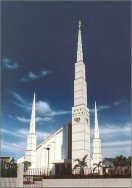
The Practical Mormon has an announcement. We can prove the existence of God, and the truth of Mormonism!
First, a bit of background. We invite you to sit for a moment, while we discuss the concept of "proof."
Let us begin by dismissing a few irrelevant definitions of the word:
• Printing: The penultimate draft of a document, re-read by an editor or writer for final corrections before printing. "Don't start printing 'til I finish with the proof."
• Mathematics: A proposition that, assuming certain axioms, some statement is necessarily true. "Part of my proof is the postulate "Two lines can intersect at only one point.'"
• Chemistry: A compound activated by mixing with water and sometimes sugar or milk. "Proof yeast"
• Archaic: An impenetrable or tested object. "Proof armor"
Now let us consider two more-relevant definitions, the applications of which are frequently confused:
• Law: A judgment. "Can we prove OJ was innocent? One jury decreed him not guilty of the murder of two people; another held him responsible for civil damages."
• Science: Evidence. "This hypothesis is supported by the following proofs."
In law, one assembles evidence, in hope of persuading a third party* of the validity of one's stance. The resulting judgment** has no scientific validity. It's merely a judgment that one side or the other prevails in court. Here, a "win" is often only a technical victory, and usually a pyrrhic one.***
In science, however, there is never a "final judgment." One assembles proof, considers contrary proof, and arrives at a tentative hypothesis or explanation. Over time, sufficient proofs are assembled to enable scientists and other observers to make less-tentative theories. Good scientists will always, of course, hold open the possibility that they have misinterpreted the evidence, and continue to take a tentative position on their explanations.
And so we arrive at a new question: Should religious discussions about "proof" fall under the heading of law, or of science?
The Practical Mormon proposes the faithful Saint should develop a judicious, and careful, combination of legal and scientific "proof."
For the investigator, and for all Saints in matters of doctrine, wisdom suggests that one take the role of scientist. If faith is belief in things "which are true," then the rational man seeks ways of finding "truth."
In fact, the prophet Alma famously proposes the rational, scientific method for seeking truth:
"But behold, if ye will awake and arouse your faculties, even to an experiment upon my words, and exercise a particle of faith, yea, even if ye can no more than desire to believe, let this desire work in you..." (Alma 32:27)The prophet then goes on to propose a scientific process for knowing the truth of any gospel question.
Thus is the Natural Man satisfied, so that the Spiritual Man, the Faithful Saint, may come to the fore.
When, then, should the Faithful Saint take the role of judge? Alma's formula to the rescue: "…even until ye believe in a manner that ye can give place for a portion of my words." (Alma 32:27, again)
Faith is the experiment; knowledge is the judgment. Science, then Law.
Thus saith the Practical Mormon.
--------------------------------
* A judge, a jury or an arbiter. In locales where judges and prosecutors are elected, the entire case may be played in public for a different party: the electorate.
** Guilty, not guilty, or in civil cases, in favor of the plaintiff or the defendant. Note that courts never find people "innocent," so every victory is tainted.
*** The fact of being hauled into court -- even when one prevails -- brings with it legal costs, opportunity costs, increased insurance rates, stress-related health problems, and a stain on one's reputation. And the adversarial nature of the legal system savages relationships between the parties to any lawsuit.














